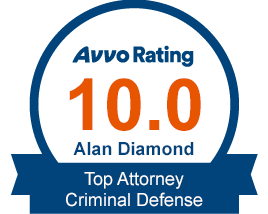Homicide Lawyers in Melbourne
Trusted Legal Representation for Murder and Manslaughter
 A homicide charge is extremely serious and conviction can impact every area of your life. It is in your best interests to immediately contact a lawyer with experience in this area of the law, as soon as you learn you are under investigation. At Funk, Szachacz & Diamond, our homicide attorneys in Melbourne provide quality legal services with the highest level of professionalism, integrity, and ethical standards.
A homicide charge is extremely serious and conviction can impact every area of your life. It is in your best interests to immediately contact a lawyer with experience in this area of the law, as soon as you learn you are under investigation. At Funk, Szachacz & Diamond, our homicide attorneys in Melbourne provide quality legal services with the highest level of professionalism, integrity, and ethical standards.
If you're facing homicide charges, contact us today at (321) 360-4446 for legal representation and guidance.
Understanding Different Types of Homicide Charges
Homicide is the unjustified killing of a human being. Homicide can be classified as murder or manslaughter.
Under Florida law, there are three degrees of murder. Murder in the first degree is either classified as "Premeditated Murder" or "Felony Murder."
Felony murder is committed when someone kills another person during the commission of one of the following felonies:
- Drug trafficking
- Arson
- Sexual battery (rape)
- Robbery
- Burglary
- Kidnapping
- Escape (from detention, arrest, trial or punishment)
- Aggravated child abuse
- Aircraft piracy
- Use of a destructive device (bomb)
- Carjacking
- Home invasion robbery
A person can be charged with felony murder even if he or she did not personally kill the victim if the defendant intended to participate in committing the felony that involved the victim's death.
Murder in the first degree is a capital felony. Florida has the death penalty and the State Attorney's Office determines if execution is a sanction for a first degree murder. The only other penalty available is life in prison without parole.
Exploring the Degrees of Murder in Florida
While any manslaughter or murder charge is serious, there are differences in the charges and penalties for each type of crime. It is possible to be charged with murder in Florida, even if you did not kill the person or intend to kill anyone, but were involved in a felony that resulted in a death.
In Florida, homicide may be charged as:
- Murder in the First Degree – Premeditated killing or a death that results from the commission of another felony, such as kidnapping, sexual battery, carjacking, or drug trafficking. This is a capital felony and may result in the death penalty.
- Murder in the Second Degree – Unjustified killing perpetrated by "an act imminently dangerous to another and evincing a depraved mind regardless of human life," but is not premeditated. This charge can also apply when a death is caused by the commission of a felony. Murder in the second degree is a first degree felony.
- Murder in the Third Degree – Occurs during the commission of a felony not covered under first or second degree murder charges. This is a second degree felony charge.
- Manslaughter – Unlawful killing that does not fit the definition of murder. Manslaughter refers to killing another person where neither premeditation or a "depraved mind" were involved. The charge is a second degree felony, while aggravated manslaughter is a first degree felony.
Regardless of the type of homicide charge you are facing, the consequences can be serious. Even if you are released from prison, the ramifications of the conviction will follow you for the rest of your life. If you are arrested for manslaughter or murder, you should not hesitate to contact a homicide attorney before any questioning.
Self-Defense and Stand Your Ground Law in Florida
In Florida, self-defense claims can play a crucial role in homicide cases. The state has a law called Stand Your Ground, which allows individuals to use force, including deadly force, to protect themselves if they reasonably believe they are in imminent danger of death or serious bodily harm.
- Stand Your Ground Law: Under this law, you do not have a duty to retreat if you are in a place where you have a right to be. This means that if you are attacked, you can defend yourself without trying to escape first.
- Self-Defense in Homicide Cases: If you claim self-defense in a homicide case, the court will evaluate whether your actions were reasonable under the circumstances. If you can prove that you acted to protect yourself, your charges might be reduced or eliminated.
- Impact on Criminal Liability: If the court accepts your self-defense claim under Stand Your Ground, it could result in a dismissal of charges or an acquittal. However, the burden of proof is on the defendant to show that their actions were justified.
Impact of Evidence in Homicide Cases
Evidence plays a key role in any homicide case, as it can significantly influence the outcome of the trial. Both physical and circumstantial evidence are used to build a case.
- Physical Evidence: This includes items like weapons, blood, fingerprints, and clothing found at the crime scene. Physical evidence can help establish the identity of the victim or the perpetrator and provide clues about how the crime was committed.
- Circumstantial Evidence: This type of evidence requires the jury to make inferences. For example, if a suspect was seen leaving the scene of a crime, it doesn’t directly prove guilt but may suggest involvement.
- DNA and Forensic Evidence: DNA analysis is crucial in connecting a suspect to a crime scene or victim. Forensic experienced often testify in homicide cases to analyze the physical evidence collected.
- Eyewitness Testimony: Witness accounts can help piece together events leading up to the crime. However, eyewitness testimony can sometimes be unreliable, which is why it is often paired with other forms of evidence.
The Role of Intent in Homicide Cases
Intent is a critical factor in distinguishing between different types of homicide charges in Florida.
- Premeditated Murder: In first-degree murder, the prosecution must prove that the defendant planned or intended to kill the victim before carrying out the act. Premeditation can make the crime more severe, often resulting in a life sentence or death penalty.
- Felony Murder: This occurs when a person commits a dangerous felony, such as robbery or arson, and someone dies during the commission of that crime. The defendant may not have intended to kill the victim, but their actions led to the death.
- Involuntary Manslaughter: Involuntary manslaughter occurs when someone causes another person’s death through reckless behavior or negligence, but without intent to kill. It is considered a lesser charge than murder and carries less severe penalties.
Understanding the role of intent in homicide cases is vital for a defense strategy. It helps attorneys build arguments for reduced charges or the possibility of acquittal.
Frequently Asked Questions (FAQ) about Homicide Cases in Florida
Can I be charged with homicide if I didn’t directly kill the victim?
Yes, under Florida's felony murder rule, a person can be charged with murder even if they didn’t directly kill the victim, as long as the death occurred during the commission of a dangerous felony, such as robbery or kidnapping.
What is the difference between first-degree and second-degree murder in Florida?
First-degree murder involves premeditated intent to kill or a death resulting from the commission of a felony. It is the most serious charge and can carry the death penalty. Second-degree murder involves an intentional killing, but without premeditation, or when a killing is caused by an act showing disregard for human life.
If I am accused of manslaughter, can I still be convicted of murder?
Yes, manslaughter is a lesser charge than murder. If the evidence shows that the killing was premeditated or occurred as part of a dangerous felony, you may face a more severe charge, such as second-degree or first-degree murder.
How does Florida's Stand Your Ground law impact homicide cases?
Florida's Stand Your Ground law allows you to use force, including deadly force, if you feel threatened with imminent harm. If the court accepts that your actions were justified under this law, it could result in a dismissal of charges or an acquittal. However, the burden of proof is on the defendant to show that self-defense applies.
Can I use self-defense in a homicide case if I was the one who initiated the confrontation?
Generally, if you were the aggressor in a confrontation, self-defense may not apply. However, if the situation escalated to the point where you feared for your life, it might still be possible to argue self-defense, especially under Florida's Stand Your Ground law.
What kind of evidence is most important in a homicide case?
In homicide cases, physical evidence such as weapons, DNA, and forensic reports is crucial. Additionally, eyewitness testimony and circumstantial evidence can also play a significant role in building a case, either for the prosecution or the defense.
What penalties could I face if convicted of murder in Florida?
Convictions for murder in Florida can carry serious penalties, including life imprisonment, the death penalty (in the case of first-degree murder), or lengthy prison sentences. The specific sentence depends on the degree of the murder and the circumstances surrounding the crime.
Why Choose Our Melbourne Lawyers for Homicide Defense?
Every attorney at Funk, Szachacz & Diamond has the common background of the highest level of recognition by the Florida Bar for competence and experience in criminal law. Our Board Certified Melbourne homicide attorneys zealously defend our clients. We have represented prominent people and families in the legal political, and business communities.
Don't face a homicide case alone. Contact us at (321) 360-4446 for a confidential consultation with our experienced attorneys.










